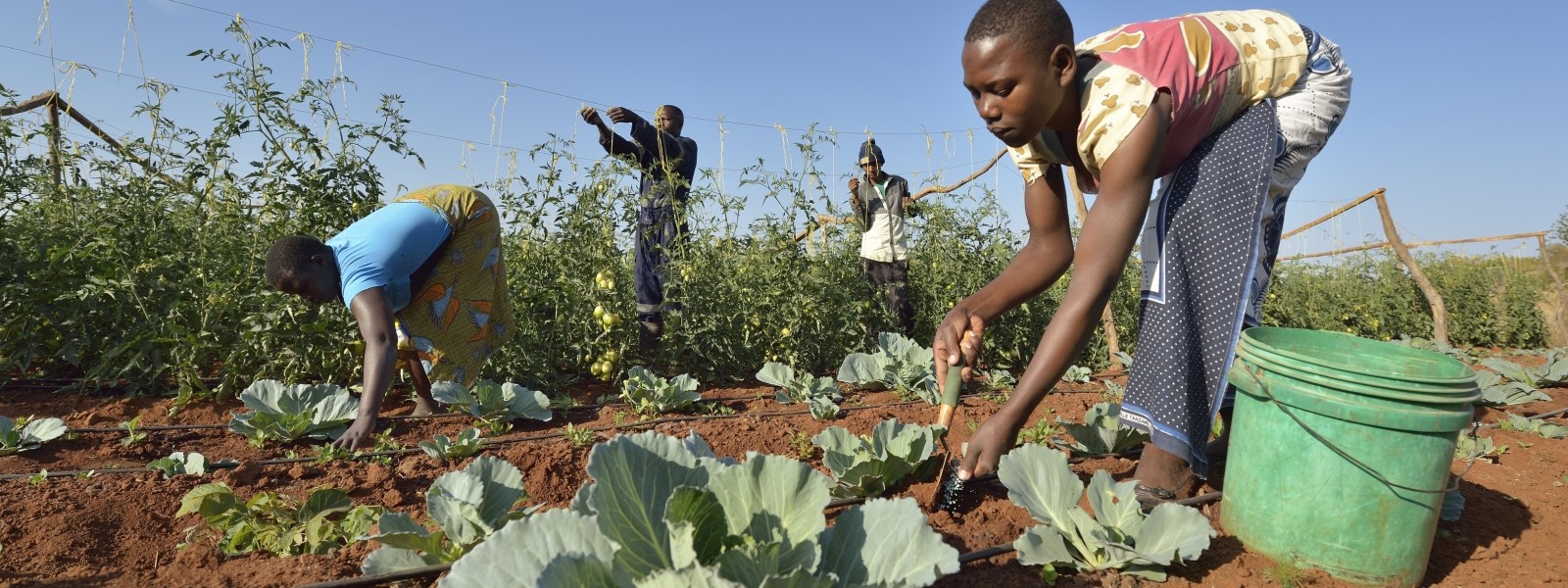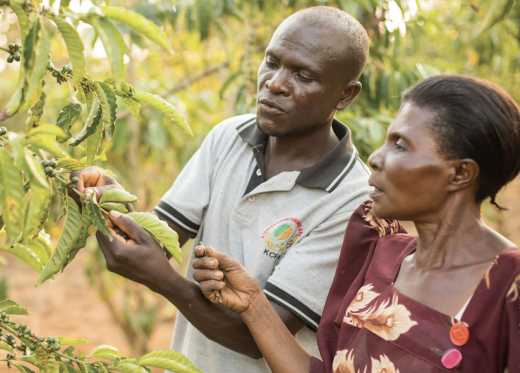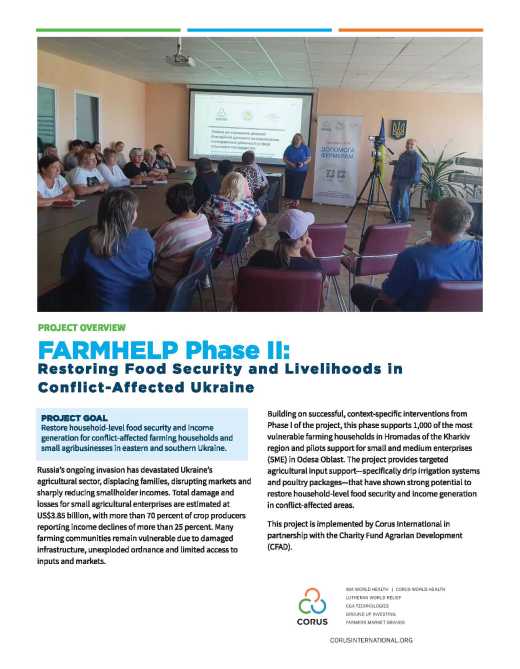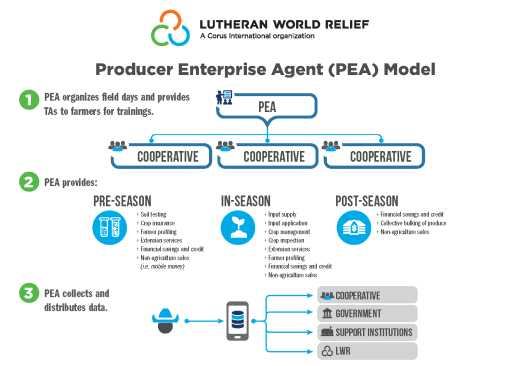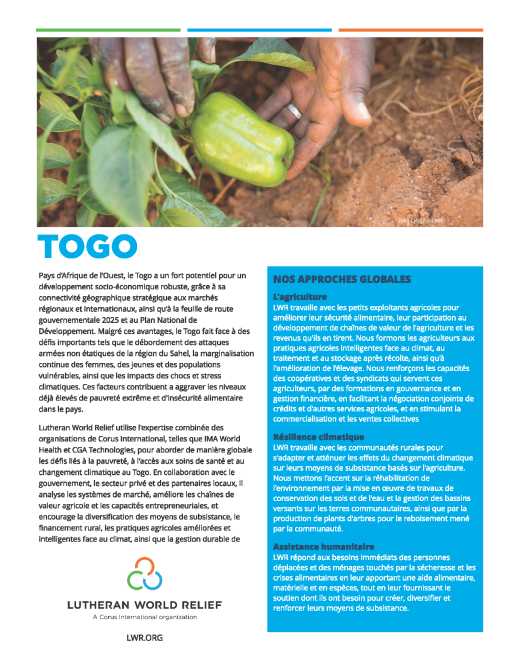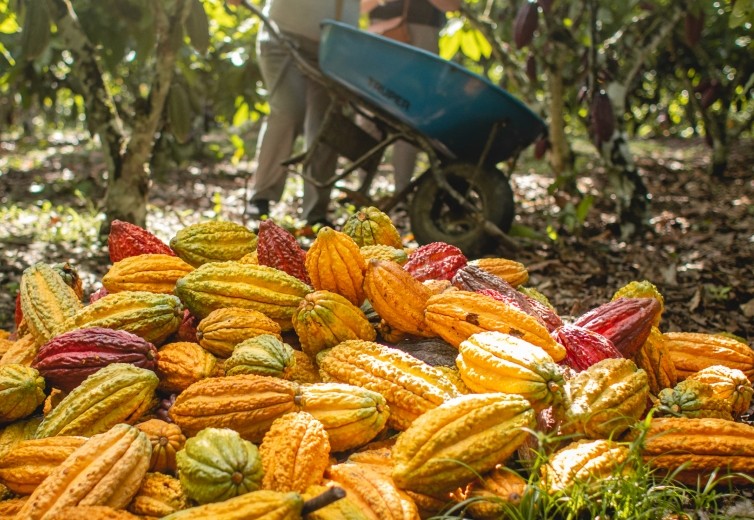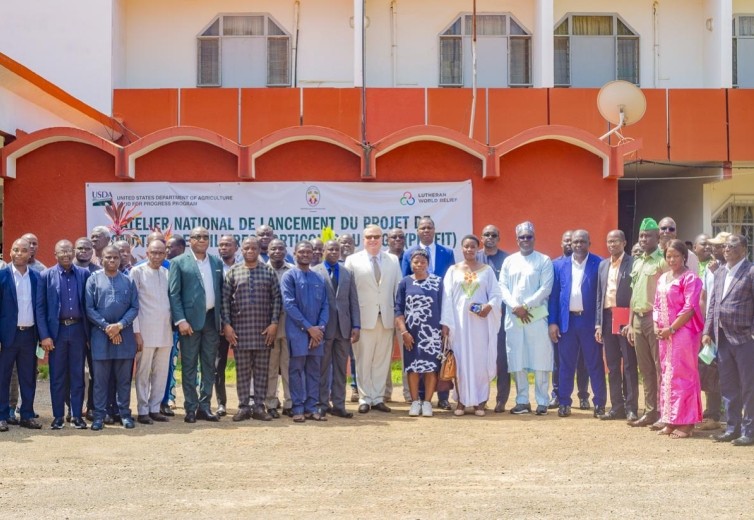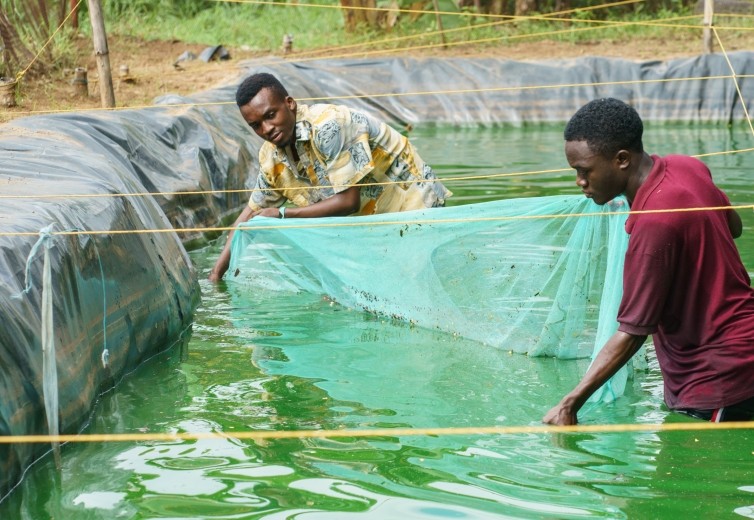Lutheran World Relief’s approach to climate-smart agriculture helps smallholder farmers adapt to and mitigate the effects of changing climates, while improving their own household food security and protecting the environment.
Climate change affects agriculture and vice versa. Rising temperatures, shifting seasons, more frequent and severe weather, and new pests and diseases devastate food production and farmers’ livelihoods; while farming contributes to greenhouse gas emission.
In our rural economic and agriculture livelihoods programming, Lutheran World Relief fosters climate resilient agriculture landscapes to ensure the sustainable productivity and wellbeing of farmers and their communities for the long-term. In our work, we apply the approaches of regenerative agriculture, Integrated Water Resource Management and Sustainable Land Management to increase farmer productivity and profitability in ways that conserve the land and water resources for current and future generations.
Lutheran World Relief promotes the following climate-smart agricultural practices with smallholder farmers, cooperatives and agrobusinesses:
- Using improved agriculture tools and post-harvest technologies
- Planting flood- and drought-tolerant and pest- and disease-resistant seed varieties
- Maintaining community seed banks and promoting locally-adapted varieties
- Diversifying crops to improve farmer and landscape resilience
- Employing conservation tillage and regeneration techniques
- Reducing or eliminating use of synthetic fertilizers
- Utilizing improved water harvesting and conservation techniques
- Encouraging agroforestry
- Harnessing renewable energies, like wind, solar, micro-hydropower
PROJECT HIGHLIGHTS
The ACORDAR project was implemented in Nicaragua to increase coffee and cacao production and farmers’ incomes while adopting climate-smart agriculture practices. The project created more than 6,000 permanent jobs in the agriculture sector and generated $19.3 million in sales of coffee and cocoa, including over $14.9 million for environmentally certified products – a 73% increase from the beginning of the project. ACORDAR helped secure more than $4 million in credit financing for cooperatives, allowing them to purchase environmentally certified cocoa and coffee from their members.
In Kenya and Uganda, the Building Coffee Producers’ Resilience to Climate Change (CAFÉ) project partnered with coffee farmer associations on the slopes of Mt. Elgon to improve the quantity and quality of their crop in the context of changing micro-climate conditions. As a result of the project, which provided demonstrations and one-on-one engagement with coffee farmers, 100% of farmers reported knowing at least one way to mitigate climate change effects on their coffee crops, applying agroforestry practices on their plantation, and growing at least one climate-adapted crop variety.
The Direct Trade Verified Sustainable Supply Chain project, funded by Farmer Brothers/Aldea Global, created a network of local technical assistance providers to promote climate-smart agriculture and other best practices to over 750 coffee farmers in Jinotega, Nicaragua, supporting investment from Farmer Brothers Coffee, a U.S.-based distributor. The percentage of farmers adopting climate-smart agriculture and other best practices increased from less than 20% in 2016 to almost 90% in 2017.
As a sub-recipient to CRS on the USAID-funded El Salvador National Cocoa Alliance project, Lutheran World Relief worked with producer groups to help members acquire Fair Trade certification for commodity cocoa, including production and processing benchmarks for sustainable land management (soil and water quality) and biodiversity.
The KARKO: Household Resilience to Climate Change project increased the resilience and sustainable land and ecosystems management of agro-pastoral households to climate change in Zinder, Niger. Through KARKO, Lutheran World Relief promoted the adoption of Moringa trees as a multi-functional crop for soil stabilization, source of nutritious food and animal feed and other climate-smart agriculture practices, such as the establishment of zai (shallow pits to catch rainwater). Throughout the project, 302 producers’ organizations, including women’s groups, planted Moringa on 118 hectares of land, and 75 local land commissions on the preservation of ecosystems were revitalized. According to participating households, the successful adoption of Moringa trees was attributed to its positive impact on the nutritional status of children under five and lactating mothers. Lutheran World Relief scaled up these approaches to vulnerable areas of Dosso, Niger through the GOMNI: Development of Household Resilience to Climate Change in Dosso project, reaching a total of 10,000 households.
In Indonesia, the Management of Resource for Agroforestry Dev in East Sumba project is decreasing the vulnerability of over 3,000 community members by building community and government capacity on forest conservation, agroforestry, and sustainable grazing as well as developing local conservation action plans.
Lutheran World Relief currently leads the cacao component of the six-country USDA-funded MOCCA project as a sub-recipient to Technoserve. Lutheran World Relief engages the private sector to create demand for climate-friendly cacao and scale climate-smart agriculture training in Honduras, El Salvador, and Guatemala. In El Salvador, the second-most deforested country in the Western Hemisphere, this approach has helped more than 180,000 farmers establish profitable cocoa agroforestry systems that contribute to carbon sequestration. The Lutheran World Relief-developed Cacao Móvil platform provides cocoa value chain actors with practical information to support cacao agroforestry, including dissemination of research from the Cocoa Research Center (CRC).
Lutheran World Relief’s TBR project engaged over 71,300 community members in 178 villages to prepare and respond to the impacts of climate change, promote social inclusion to strengthen resilience to floods that devastate agriculture-based livelihoods, and build cross-border early warning systems. The project used agriculture extension linked to seasons and crops to promote CSA including submergence and drought-resilient varieties of rice and vegetables, riverbed farming, portable vegetable nurseries, raised rice nurseries, and hanging vegetable farms. Private sector partner Muktinath Krishi Company Ltd. facilitated farmers’ access to climate smart inputs and arranged buyback guarantees. Submergence-tolerant rice significantly reduced participating farmers’ economic losses and 30% of participating households’ incomes increased despite severe floods. Project-promoted safety net provisions included agricultural insurance and livelihood-oriented savings and loans. Through savings groups, nearly 1,000 individuals purchased insurance and groups secured nearly $75,000 in loans and government support.
In Colombia, the Starbucks Foundation-funded Pro-Café project helped farmers transform 30 hectares of coffee monoculture into biodiverse agroforestry systems. Climate-smart agriculture practices adopted by 108 farms contributed to a 50% reduction in pollution levels at nearby water quality sampling sites, benefitting nearly 40,0000 people living in the region.
The Osprey Foundation-funded Protecting Water Resources in Colombia’s Coffee Regions project reduced watershed pollution and ecosystem degradation in an emerging coffee producing region. The project worked with coffee growers to protect 19 water sources in the San Jorge Creek micro-basin. To reduce the negative impact of coffee processing on the local watershed, the community consolidated coffee-washing operations to better manage pollution and reduce water consumption. The project also supported development of biodigesters which utilized coffee pulp and other waste to produce compost through a vermiculture system, promoting further climate change mitigation efforts of carbon sequestration.
Lutheran World Relief implements the USAID BHA-funded Strengthening Local Governance for Disaster Resilient Communities (SAKSHAM) project to strengthen community resilience through an integrated approach to disaster risk reduction and management (DRRM) and local capacity strengthening. While advancing climate-smart agriculture practices, SAKSHAM impacts nearly 300,000 community members who live in flood-prone districts near the Koshi and Kamala rivers. By supporting livelihoods and financial resilience through cooperatives, community disaster risk management committees (CDMCs), microfinance institutions and insurance programs, LWR is strengthening community capacity and advancing the inclusion of women and marginalized groups in DRRM planning. Government capacity is enhanced through localization of emergency operation centers and uptake of the Building Information Platform Against Disaster (BIPAD) portal.
Lutheran World Relief's USDA Food for Progress project engages over 170,000 farmers along with processors, exporters, and other stakeholders representing over 50% of Nigeria’s cocoa sector. TRACE leverages partnerships with the private sector and works through farmer organizations to reach economies of scale for climate-smart agriculture training. At least 57,000 farmers in Ondo and Cross river will be trained in climate-smart agriculture, including agroforestry and water management for cocoa productivity.
Lutheran World Relief partnered with the private sector to improve inclusive outcomes for marginalized communities through the Yuwa Udhhami: Youth Entrepreneurship project. The project enabled youth from marginalized communities in Nepal’s Bardiya district to develop entrepreneurial skills and capacity in agriculture-based small and medium enterprises (SMEs). The project targeted ethnic minorities and women as it trained youth on the production of high-value crops, provided coaching for business plan development, and created linkages to financial institutions, cooperatives and markets. Promotion of climate-smart agriculture practices through youth-led enterprises enhanced ecosystem functioning and led to the adoption of profitable enterprises.


